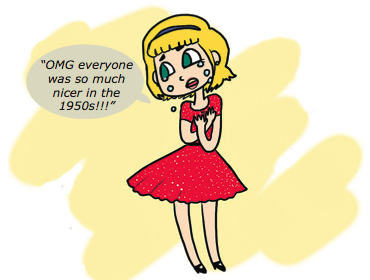Blind ‘wrong generation’ comments must stop
Comments hating on current era grow repetitive
More stories from E.V Phillips
If you’ve spent more than a month browsing the Internet in some fashion, there’s a chance you have come across a certain saying which is tossed around from time to time, “I was born in the wrong generation.”
This now seemingly popular saying must be stopped immediately, and people who deep down really believe that we live in a world that is far worse that one 20 to 50 years ago must consider the pros and cons of the era they obsess over before spreading their opinions all over the Internet and all over the real world.
The phrase itself has gained popularity in recent years as people have gone back and compared the pop culture, more specifically music, and deemed the styles they listened to superior to today’s main- stream pop and hip-hop tastes.
This trend of comparison eventually spread into more than just music, with styles, politics and the way of life coming into play.
Some claimed they were “born in the wrong generation.” “Defener” was a mock- ing term used to call out peo- ple who overly-defended older eras.
Feeling nostalgia for some- thing and reminiscing is far from bad, and appreciating the lifestyles and pop culture of those who lived before is com- pletely fine.
However, when the hatred for the modern era grows in the minds of people make it their mission to hate on modern trends, listening to their rants really gets annoying. From there, they often talk about how an era they weren’t alive for was superior and then whine about how modern life sucks compared to the life they’ve built up in a past decade. This is simply aggravating and stupid.
Some of the most common decades people seem to adore are the 1950s and 1960s, mostly deemed the time periods with the best music of all time, iconic classy fashion, and economic prosperity politically led by some of the best U.S. presidents of all time.
This causes the social cons to be overlooked, and they often don’t take into account how different life was, with “different” often alluding to negativity. In the 1950s especially, though civil movements were not quite active, teenagers became their own social class and were often separated from the adult society. Many delinquents starting rebellions led adults to worry of a “teenage takeover.”
Though this may sound good for youth both today and in the past, the separation created an restless society which would have been hard to repair.
This would most certainly not want to be a positive thing,
A person thinking they’re su- perior to others due to their different and older tastes in music is nothing more than an ignorant person. Now defeners must flush the ideas they have out of their minds and attempt to enjoy the world they live in.

